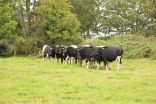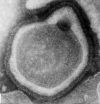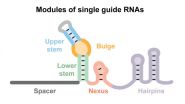(Press-News.org) A new approach for responding to and managing disease outbreaks is being proposed by a team of epidemiologists led by two Penn State University researchers. The team's flexible approach could save many lives and millions of dollars.
The approach, called "adaptive management," allows decision-makers to use knowledge they gain during an outbreak to update ongoing interventions with the goal of containing outbreaks more quickly and efficiently. Current efforts to prevent or stem such outbreaks may fall short because of uncertainty and limited information about the real-time dynamics of the specific disease outbreak. The researchers have written a scientific paper on this adaptive management approach that will be published on 21 October in the open-access journal PLOS Biology.
"Responders often have incomplete information during a disease outbreak," said Katriona Shea, professor of biology at Penn State and a leader of the research team. "Everyone is trying to make rapid decisions, but we don't have reliable information to make the best decisions. Even if we have information about a previous outbreak, no two outbreaks are identical. Adaptive management involves planning to learn as you act for the most effective, efficient response."
In their PLOS Biology paper, the authors present two scenarios in which adaptive management likely would improve outcomes. One of Shea's co-authors is Matthew Ferrari, a leader of the research team and an assistant professor of biology and statistics at Penn State, who consults with organizations such as the Centers for Disease Control, the World Health Organization, and Doctors Without Borders on disease-outbreak prevention and response, cited measles vaccination as one example.
In measles outbreaks, Ferrari explained, responders need to make decisions and to act quickly based on the information available. An outbreak contained to young children would call for a fast and nimble response, moving from town to town very quickly and vaccinating only young children. Conversely, an outbreak affecting a broader age range requires a slower, broader, more methodical response. "There are tradeoffs to taking the wrong approach," Ferrari said. "If you did the fast, nimble child-vaccination response but the outbreak had a broader risk, you would miss a lot of people. If you did the slower, broader, more-methodical response, you'd protect lots of people but the response may not be fast enough."
Organizations such as Doctors Without Borders work quickly to contain outbreaks as well as to prevent further spread. "Preparing, in advance, to include monitoring and evaluation with an eye toward changing management actions in light of changing conditions on the ground is the key to adaptive management. We've shown that a plan to manage adaptively can change the recommended actions on day one because, for example, you only need to manage for the worst-case scenario if it arises," Ferrari said.
The second example the researchers cite is an outbreak of foot-and-mouth disease (FMD) in the United Kingdom in 2001. During that outbreak, almost 600,000 cattle and 4 million sheep were either infected or culled in an effort to prevent further spread of the disease. "Culling decisions during the outbreak were contentious as there was so much uncertainty about the spatial scale of transmission," Shea said. "Many farmers felt that they were being penalized for being in the vicinity of infected farms when they believed that they were not at risk."
Adaptive management in the case of foot-and-mouth disease initially would employ a less-severe approach that would reduce the number of cattle culled and rely on real-time updates to modify responses -- more-severe culling would be recommended only if justified by the spread of the outbreak. According to Shea, if foot-and-mouth disease were to break out in the United States -- a very real risk -- adaptive-management measures could result in significant savings in terms of reduced livestock losses. "The United States does a huge trade in beef, and the second we are infected all that international trade would shut down," Shea said. "Foot-and-mouth disease is highly infectious and would have to be contained quickly. Adaptive management would incorporate a plan to change intervention efforts appropriately as events unfold."
Historically, Ferrari said, "the argument has been for a very static policy because it's clear and easy to implement. We recognize that a more nuanced, context-specific approach could be better. We need to put the possibility of changing midstream into our toolbox, integrating scientific discovery with policymaking to improve intervention efforts."
INFORMATION:
A video relating to the research can be found here: https://www.youtube.com/watch?v=NmR-Y25IOio&feature=youtu.be
The research was funded by the U.S. National Institutes of Health EEID award 1 R01 GM105247-01, the U.K. Biotechnology and Biological Sciences Research Council, the RAPIDD Program of the Science and Technology Directorate of the U.S. Department of Homeland Security, and the Bill and Melinda Gates Foundation.
CONTACTS
Katriona Shea: kus3@psu.edu, (+1) 814 321 4809
Matthew Ferrari: mferrari@psu.edu, (+1) 814-865-6080
Barbara Kennedy (PIO): science@psu.edu, 814 863 4682
IMAGES
High-resolution images are online at http://science.psu.edu/news-and-events/2014-news/SheaFerrari10-2014 , which is where the press release and image captions will be published after the embargo lifts.
CAPTIONS (from top to bottom on the above pre-embargo page)
Top -- Description: Cows, Credit: Alec Brown
Middle -- Description: Microscopic image of the measles virus, Credit: Shmuel Rozenblatt, Tel-Aviv University
Bottom -- Description: Measles virus budding out of an epithelial cell, Credit: Shmuel Rozenblatt, Tel-Aviv University
Research by a team of epidemiologists from the UK and the USA has proposed a new approach for responding to and managing disease outbreaks. They say lives and money could be saved if decisions are adapted to relevant information about the dynamics of the current crisis and not based on retrospective analyses of prior crises, trials and interventions.
Dr Michael Tildesley, a lecturer in infectious disease modelling in the School of Veterinary Medicine and Science at The University of Nottingham and co-author of the paper, said: "Organisations involved in the outbreak of ...
What is the best way to handle a disease outbreak? Current efforts to prevent or stem such outbreaks may fall short because of uncertainty and limited information about the real-time dynamics of the specific disease outbreak. A team of epidemiologists, led by two Penn State University researchers, proposes a new approach for responding to and managing disease outbreaks -- a flexible approach that could save many lives and millions of dollars.
The approach, called "adaptive management," allows decision-makers to use knowledge they gain during an outbreak to update ongoing ...
In 2005, in a landmark paper viewed well over a million times, John Ioannidis explained in PLOS Medicine why most published research findings are false. To coincide with PLOS Medicine's 10th anniversary he responds to the challenge of this situation by suggesting how the research enterprise could be improved.
Research, including medical research, is subject to a range of biases which mean that misleading or useless work is sometimes pursued and published while work of value is ignored. The risks and rewards of academic careers, the structures and habits of peer reviewed ...
Cesarean delivery is the most common inpatient surgery in the United States. US cesarean rates increased from 20.7% in 1996 to 32.9% in 2009 but have since stabilized, with 1.3 million American women having had a cesarean delivery in 2011. Rates of cesarean delivery vary across hospitals, and understanding reasons for the variation could help shed light on practices related to cesarean delivery.
Katy Kozhimannil (University of Minnesota School of Public Health, Minneapolis, USA) and colleagues S.V. Subramanian and Mariana Arcaya (Harvard School of Public Health, Boston, ...
personalised nutrition based on an individual's genotype - nutrigenomics - could have a major impact on reducing lifestyle-linked diseases such as obesity, heart disease and Type II diabetes
a study of more than 9,000 volunteers reveals strict regulations need to be put in place before nutrigenomics becomes publicly acceptable due to people's fears around personal data protection
led by Newcastle University, UK, and involving experts from the universities of Ulster, Bradford, Porto (Portugal) and Wageningen (Netherlands), the study is the first to assess consumer acceptance ...
EUGENE, Ore. -- Oct. 21, 2014 -- University of Oregon chemists have devised a way to see the internal structures of electronic waves trapped in carbon nanotubes by external electrostatic charges.
Carbon nanotubes have been touted as exceptional materials with unique properties that allow for extremely efficient charge and energy transport, with the potential to open the way for new, more efficient types of electronic and photovoltaic devices. However, these traps, or defects, in ultra-thin nanotubes can compromise their effectiveness.
Using a specially built microscope ...
MADISON, Wis. — As Dane County begins the long slide into winter and the days become frostier this fall, three spots stake their claim as the chilliest in the area.
One is a cornfield in a broad valley and two are wetlands. In contrast, the isthmus makes an island — an urban heat island.
In a new study published this month in the Journal of Applied Meteorology and Climatology, University of Wisconsin-Madison researchers highlight the urban heat island effect in Madison: The city's concentrated asphalt, brick and concrete lead to higher temperatures than ...
BETHESDA, MD – Age-related loss of the Y chromosome (LOY) from blood cells, a frequent occurrence among elderly men, is associated with elevated risk of various cancers and earlier death, according to research presented at the American Society of Human Genetics (ASHG) 2014 Annual Meeting in San Diego.
This finding could help explain why men tend to have a shorter life span and higher rates of sex-unspecific cancers than women, who do not have a Y chromosome, said Lars Forsberg, PhD, lead author of the study and a geneticist at Uppsala University in Sweden.
LOY, ...
(Philadelphia, PA) – Chest pain doesn't necessarily come from the heart. An estimated 200,000 Americans each year experience non-cardiac chest pain, which in addition to pain can involve painful swallowing, discomfort and anxiety. Non-cardiac chest pain can be frightening for patients and result in visits to the emergency room because the painful symptoms, while often originating in the esophagus, can mimic a heart attack. Current treatment — which includes pain modulators such as selective serotonin reuptake inhibitors (SSRI) — has a partial 40 to 50 ...
Customized genome editing – the ability to edit desired DNA sequences to add, delete, activate or suppress specific genes – has major potential for application in medicine, biotechnology, food and agriculture.
Now, in a paper published in Molecular Cell, North Carolina State University researchers and colleagues examine six key molecular elements that help drive this genome editing system, which is known as CRISPR-Cas.
NC State's Dr. Rodolphe Barrangou, an associate professor of food, bioprocessing and nutrition sciences, and Dr. Chase Beisel, an assistant ...






